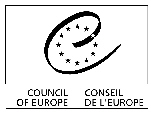

PARALLEL EVENT
“From here to e-democracy: promoting e-participation,
and
dealing with ‘harmful content’ and the ‘risk of harm’ from online and related offline activities – responsible behaviour by key actors”
organised by the Council of Europe
Tunis, 17 November 2005, 3 – 7 pm, Room Jerba,
Exhibitions Park and International Trade Centre, 2015 LE KRAM, TUNIS, TUNISIA
|
The Council of Europe approaches the Information Society from a human rights and democracy perspective focusing on both its potential to promote the exercise of human rights and to facilitate democratic reform and practice as well as on the potential dangers that it presents for children, young people and vulnerable adults who use the Internet and other new communication services often without any awareness, education or training.
Taking some of the Council’s recent work as a starting point, the purpose of the first section of the parallel event is to explore effective ways to use ICT to strengthen the participation, initiative and engagement of citizens in national, regional and local public life.
In the second session, the Council of Europe will present and debate the results of its recent research regarding harmful content in order to promote wider understanding, education and action in response to this phenomenon.
|
PROGRAMME
First session: E-democracy: New channels for voting and civic participation (3 – 5 pm)
15:00 - Introduction and overview:
Michael REMMERT, Head of Council of Europe E-governance Project
15:10 - Phil NOBLE, Charleston (SC), USA, Founder and CEO of PoliticsOnline:
Keynote speech: E-democracy: state of the art and future development
15:30 - Panel discussion:
- Julian BOWREY, Head of UK National Project on Local e-democracy:
The UK national local e-democracy project
- Lawrence PRATCHETT, De Montfort University, Leicester, UK:
The barriers to e-democracy
- Alexander TRECHSEL, Professor, European University Institute, Florence, Italy:
E-voting and new forms of e-participation in Europe and Latin America
- Representative of the European Commission, DG Information Society (tbc):
16:40 - Conclusions
16:45 - Close of session
Second Session: ‘Harmful Content’ And The ‘Risk Of Harm’ From Online And Related Offline Activities - Responsible Behaviour by Key Actors (5 – 7 pm)
17:00 Introduction and overview:
Lee HIBBARD, Administrator, Media Division, DGII-Human Rights, Council of Europe
17:05 - ‘Harmful content’ and the ‘risk of harm’:
Joanne BRYCE, and Rachel O’CONNELL, Cyberspace Research Unit, University of Central Lancashire, UK
17:30 - Harmful content and responsible behaviour - Introduction by the moderator
Mark KELLY, Director, Human Rights Consultants, Ireland
17:40 - The roles and responsibilities of key actors in the Information Society
- Divina FRAU-MEIGS, Professor, Université Paris 3-Sorbonne Sociologue des Médias, vice-présidente, AIERI/IAMCR (Ass.Int.des Etudes et Recherches en Info-com), PARIS, France
- Heleen JANSSEN, Legal Specialist/Adviser, Ministry of the Interior and Kingdom Relations, The Netherlands
- Phil ARCHER/Stephen BALKAM, Internet Content Ratings Association, United Kingdom
18:40 - Concluding remarks: Mark KELLY, Director, Human Rights Consultants, Ireland
18:45 - Close of session


 Print
Print  Send
Send 
